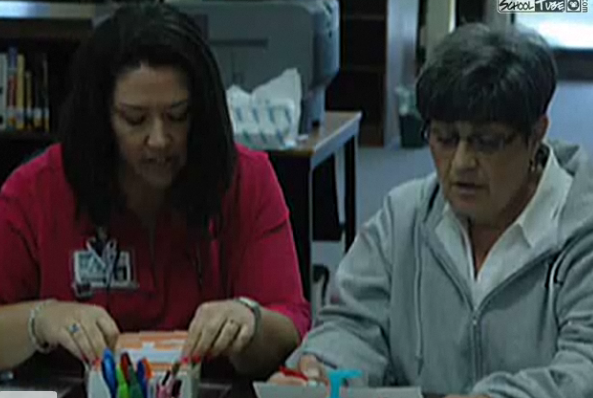

By Unique Larry
Sitting in a room with the love of her life, librarian Vicki Cosgrove realized that the history of her kidney failure had spanned many years. This final realization brought with it a flood of thoughts and emotions.
Cosgrove was fortunate in her fight with kidney failure, she found a donor. Cosgrove was fortunate enough to have been able to receive a kidney after two years of waiting on the dialysis list, from a close personal friend Bill Vickers.
“You always hope you will hold out until a kidney becomes available.” Cosgrove said.
There are 190,000 people in the United States waiting for organs, such as livers, kidneys, hearts, lungs, eyes and even tissue.
Vickers had to go through various tests making sure that he was healthy enough to live on with just one kidney. Luckily enough for Cosgrove. Vickers passed with flying colors, and was able to donate.
In addition to Vickers help through his life-saving organ donation, Cosgrove also depended on the help of others.
“My husband was with me throughout the entire process,” Cosgrove said. “I am an independent person and take care of myself, however, when there are life altering decisions to be made, my husband and I discuss and work through them together.”
Before Cosgrove received the transplant, she depended on the help of dialysis to keep her healthy.
“Dialysis is a life saving treatment but extremely restrictive,” Cosgrove said. “My goal from the onset of the end of my kidneys lives, was to hopefully get a transplant.”
Vickers had to go through various tests making sure that he was healthy enough to live on with just one kidney. Luckily enough for Cosgrove. Vickers passed with flying colors, and was able to donate.
“The transplant affects me daily. I am required to take a tremendous amount of anti-rejection medication called immunosuppressants which keep my body from rejecting the transplanted kidney. There are many side effects associated with this kind of medication, such as a lowered immune system causing me to be susceptible to colds, flu, and anything that is floating around in the air. But I don’t feel any different from anyone else who does not have a transplant‚” Cosgrove said.
There are several students interested in trying to help reduce the large range of people on the dialysis list such as juniors Cynthia Fulton and Carlina Tavarez and senior Andre Nix.
“When I die my body will completely useless to me. Organ donation is, if you think about it, one of the easiest ways to help someone. Most people want to be remembered for something when they die, organ donation is the way to go,” Nix said.
Fulton feeling that not donating is a waste of organs has already made the decision to try to be an organ donor.
“If I cannot use something but someone else can why would I keep it from those people who need them,” Fulton said.
Tavarez had a similar thought process when it came to donation.
“I feel that if someone needs something vital to their life and I had no real use of it, they should get it.”
Other students like senior Blaine Harper have concerns about how organ donation may affect what happens to their body after they die.
“Well, I figure, unless I’m mangled in a horrible accident I would like to be fully intact for the funeral, I guess for family’s sake, sentimental or what not,” Harper said. “Also if there is an afterlife of any kind, I also think maybe for that purpose it would be good to keep everything. But then again on that note, as Christians believe, the donating of organs to another to life perhaps is a good deed,” Harper said.
“I respect people who have genuine reasons to be against organ donation,” Tavarez said. “But overall I think [organ donation] is a very admirable thing to do.”
During National Organ Donors Month many will reflect on how they could save someone else’s life. And many like PGHS librarian Vicki Cosgrove will think how lucky they are to have been touched by the generosity of angels such as Bill Vickers who have saved someone’s life.